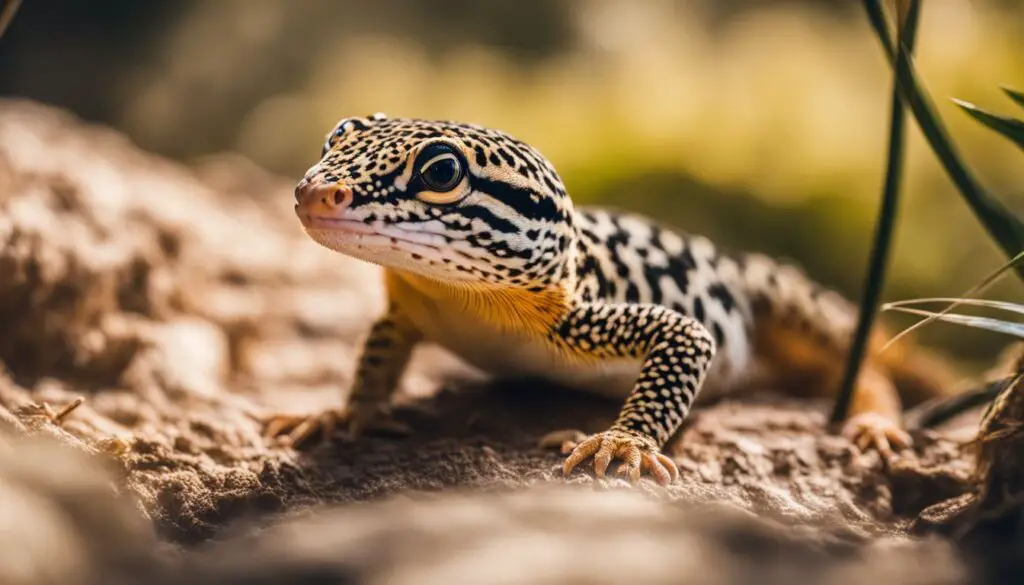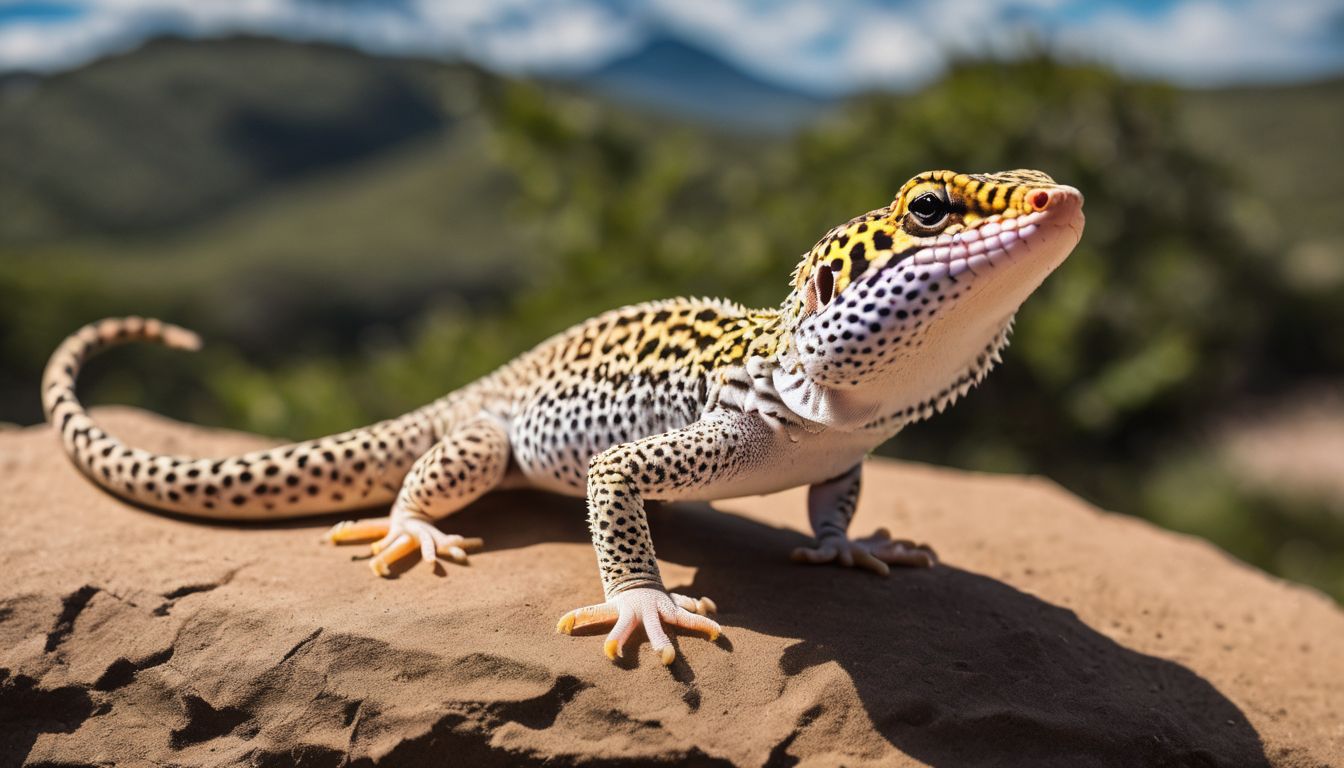Are you wondering how sharp your leopard gecko’s mind really is? You’re not alone! Many pet owners are curious about their little reptile buddy’s brainpower. Do they know who you are, or are they just after the crickets in your hand? It’s a question that tickles the minds of many gecko guardians.
Here’s a fact to chew on: leopard geckos might surprise you with their smarts! They’ve shown some pretty clever behaviors that suggest there’s more going on upstairs than we might expect from such small creatures.
This blog post dives into the fascinating world of leopard gecko intelligence. We’ll explore what makes these scaly friends tick – from recognizing smells to solving problems and even socializing.
Understanding your pet better can help create a stronger bond and provide them with enrichment they’ll love. Ready for an enlightening journey into the minds of leopard geckos? Let’s get started – it’s smarter than you think!
Key Takeaways
- Leopard geckos display intelligence through problem – solving abilities, recognizing owners and pheromones, and exhibiting complex social behaviors.
- Their cognitive skills include associative learning, spatial memory, and the capability to navigate their environment effectively.
- The balance between instinctual behaviors and higher – level cognitive functions contributes to their survival in different environments.
Defining Intelligence in Reptiles

Intelligence in reptiles encompasses both instinctual behaviors and cognitive skills, including problem-solving abilities, social interactions, and communication. Understanding the different aspects of intelligence in leopard geckos can provide valuable insights into their behavior and capabilities.
Instinct vs. Cognitive Skills
Leopard geckos have instincts that help them stay safe and find food. Instincts are like built-in rules they know from when they’re born, telling them how to survive without learning from others.
They know how to hunt bugs and hide from things that might hurt them. This is part of what makes leopard geckos good starter pets for new owners.
But these lizards can also learn new things, which shows their brain works well. Cognitive skills mean using the mind to solve problems or remember where something is. Leopard geckos show these skills when they look for ways out of their cages or explore new places.
Some people see this as signs that geckos are smart in their way.
Indicators of Intelligence in Leopard Geckos

Recognizing Owners and Pheromones
Leopard geckos can tell their owners apart from strangers. They use their sharp sense of smell to notice who is who. This shows they might be smart in ways we did not think about before.
Their brains pick up on the special scents, called pheromones, that people and other animals have. This helps them know if someone is safe or not.
They also sniff out these pheromones to talk to other geckos. It’s how they find friends and stay away from enemies. Leopard geckos do not make loud sounds like birds or dogs. Instead, they use body movements and smells to say things to each other.
Hunting and Problem-Solving Abilities
Just like they learn to know their owners, leopard geckos show smart moves when they hunt. These little lizards have sharp skills for finding and catching food. They wait quietly and then quickly grab insects with their strong jaws.
This shows good thinking because they must understand how to get their meal in the best way.
Leopard geckos also face puzzles in their homes, like climbing or getting around barriers to reach a tasty treat. Their ability to solve these problems can surprise people. It proves that these reptiles can think well enough to handle challenges in their environment.
They don’t just act on instinct; they actually figure out what steps will lead them to success.
Social Behaviors and Communication
Leopard geckos display some interesting social behaviors and communication methods. They are solitary creatures, but they often communicate through body language and pheromones. Despite their solitary nature, leopard geckos can exhibit aggressive behavior towards each other, especially during territorial disputes or mating interactions.
These behaviors are essential for survival in the wild and play a significant role in their overall social dynamics.
Leopard geckos also use tail wagging as a form of communication to convey dominance or submission. They may also vocalize through chirps or hisses to express distress or establish territory boundaries.
The Role of Brain Size and Genetics
The size of a leopard gecko’s brain and its genetic makeup can play a significant role in determining their cognitive abilities. Inbreeding can also impact their cognitive function.
Impact of Inbreeding on Cognitive Function
Inbreeding in leopard geckos can affect their cognitive function. When geckos are bred within close genetic lines, it can lead to a reduction in their overall intelligence and health.
Inbreeding often results in a limited gene pool, which may increase the likelihood of certain genetic diseases and weaken cognitive abilities. This is important because maintaining genetic diversity is crucial for the overall well-being and intelligence of leopard geckos, ensuring that they remain healthy and mentally sharp.
Studies and Observations on Leopard Gecko Behavior
Researchers have conducted experiments on learning and memory in leopard geckos, providing valuable insights into their cognitive abilities and behavioral patterns. For more fascinating details on the intelligence of these amazing reptiles, keep reading!
Experiments on Learning and Memory
Researchers have conducted experiments to understand how leopard geckos learn and remember. Studies show that they are capable of associative learning, linking a specific stimulus with a particular outcome.
This means that they can learn to associate certain scents or objects with food, indicating a level of cognitive ability in terms of memory retention and recall.
Some observations also suggest that leopard geckos may possess spatial memory, enabling them to remember the layout of their environment and navigate it effectively. These experiments shed light on the cognitive abilities of these reptiles, highlighting their capacity for learning and memory retention, which adds to our understanding of their overall intelligence.
Understanding Leopard Gecko Dietary Needs and Hunting Skills
Leopard geckos are insectivores, meaning they primarily eat insects like crickets, mealworms, and roaches. To meet their dietary needs, it’s vital to provide a variety of gut-loaded insects to ensure they receive essential nutrients.
These geckos have specialized hunting skills; they stalk and pounce on prey using lightning-fast movements. Their keen eyesight helps them track and catch their prey with accuracy.
Leopard geckos also possess an interesting hunting behavior called “tail waving,” where they wave their tails to mimic the movement of insects, luring them closer for an easy catch.
It’s crucial for novice owners to understand and replicate these natural hunting behaviors when feeding leopard geckos in captivity to support their mental stimulation and overall well-being.
The Balance of Instinct and Intelligence
Exploring how the natural instincts of leopard geckos work in tandem with their cognitive abilities to help them thrive in their environment. Learn more about the fascinating balance between instinct and intelligence in these unique reptiles.
Survival Skills as a Measure of Smartness
Leopard geckos are smart when it comes to survival. They have strong hunting skills and can find their food efficiently. In the wild, they use their intelligence to avoid predators and seek out safe hiding spots.
Their ability to survive in different environments shows their smartness as reptiles. This makes them interesting pets for beginners who want a fascinating animal with unique cognitive abilities.
Conclusion
In conclusion, understanding the intelligence of leopard geckos involves assessing their behaviors and cognitive abilities. Their recognition of owners and problem-solving skills hint at their higher-level cognitive functions.
While brain size plays a role, it’s essential to consider the balance between instinctual and learned behaviors. Emphasizing the practicality of observing and nurturing these traits in pet care can lead to a deeper connection with these fascinating reptiles.
By exploring further resources on reptile behavior, enthusiasts can continue learning about the captivating world of leopard geckos.
FAQs
1. Are leopard geckos intelligent animals?
Leopard geckos display basic forms of learning and problem-solving, but they are not considered highly intelligent compared to some other reptiles.
2. How can I tell if my leopard gecko is behaving intelligently?
You may notice your leopard gecko displaying curiosity, recognizing feeding patterns, and exhibiting territorial behaviors, indicating a level of intelligence.
3. Can I train my leopard gecko to do tricks or tasks like a dog or cat?
While you can condition your pet for routine handling and feeding, the level of training achievable with a leopard gecko is limited due to their cognitive abilities.
4. Do leopard geckos have good memory?
Leopard geckos have shown the ability to recognize familiar environments and remember feeding schedules, suggesting they possess a certain level of memory retention.
5. What factors contribute to determining the intelligence of a leopard gecko?
The size of their brain in proportion to body size, observation of problem-solving skills, recognition abilities, and social behaviors all play roles in evaluating their intelligence levels.




